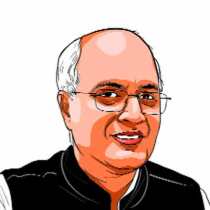A good ally to invoke, difficult to walk with
Prime Minister Modi recently invoked Gandhi as he talked of capitalists. But Gandhi believed that owners must become trustees.

Gandhi clearly accepts the wealth-creating role of the capitalist and recognises that the ‘business talent and knowhow’ has been acquired through experience and we must grant the value of this effort. (Illustration: CR Sasikumar)
The statement by Prime Minister Narendra Modi that he was not afraid to be seen in the company of industrialists is a welcome dampener to the mindless capitalist- bashing that passes for political opposition today. That he invoked Mahatma Gandhito strengthen his argument is even more welcome, for Gandhi is always a good ally to have in public life. But he is also a dangerous one. He is not quiescent, not embarrassed by his beliefs (he went to see the British monarch in a dhoti not a suit, remember), always demanding the highest standards of public behaviour. So what was Modi signaling when he chose to walk with Gandhi?
It is true that Gandhi was not against capitalists. It is true that Gandhi believed that they must be allowed to keep a share of the profits they earned. It is true that Gandhi saw them as bringing benefits by their knowledge and hard work. It is true that he lived in G D Birla’s house. In sum, Gandhi was against capitalism not capitalists. Since this may sound paradoxical, for “how can one be against capitalism but for capitalists?”, let us look at Gandhi’s statements on these issues.
Trustees not owners: He was once asked “You have asked rich men to be trustees?” to which he replied: “Everything belonged to God and it was from God. Therefore, it was for His people as a whole, not for a particular individual. When an individual had more than his proportionate portion he became a trustee of that portion for God’s people”. (Harijan, February 23, 1947).
There are three important conceptual shifts that Gandhi makes in this statement. The first and perhaps most important is the shift in the status of the rich person (capitalist) from being an owner to becoming a trustee. Here there is a shift in the bundle of property rights because as an owner the capitalist can do whatever she wishes with her wealth, like build the most expensive house on earth, whereas in the latter case this is not possible for it is constrained by the injunction that the wealth must be used for God’s people.
The second major shift is in placing ownership of the property with God and above any individual. By arguing thus, Gandhi wished to argue that we are the trustees of property holding it for the whole people. In this second conceptual shift, Gandhi creates the basis for the use of property primarily in the public interest.
The third significant shift is the recognition that there are two parts to the wealth that is created. One portion belongs to the capitalist and the rest belongs to God (or the people). It is important to recognise these two portions. That which belongs to the individual is for him or her to use and dispose as he or she desires unconstrained by social obligations. Buy a yacht and keep it in Nice. Buy diamonds from… It is only the other portion that is held in trust to which the obligations of trusteeship applies. The challenge here is to determine which, or how much, is the individual’s “proportionate portion” and which is the portion that belongs to God.
Again, let me turn to Gandhi to get some clues.
The 1 per cent pledge: “My idea of society is that while we are born equal, meaning that we have a right to equal opportunity all have not the same capacity. It is, in the nature of things, impossible… People with talents will have more, and they will utilise their talents for this purpose. If they utilise their talents kindly, they will be performing the work of the State. Such people exist as trustees, on no other terms. I will allow a man of intellect to earn more, I would not cramp his talent. But the bulk of his greater earnings must be used for the good of the State…”
And now comes the clincher.
“I am inviting those people who consider themselves as owners today to act as trustees, that is, owners not in their own right, but owners in the right of those whom they have exploited. I will not dictate to them what commission to take, but ask them to take what is fair, for example, I would ask a man who possesses Rs 100 to take Rs 50 and give the other Rs 50 to the workers. But to him who possesses Rs 1,00,00,000 I would perhaps say, take 1 per cent for yourself. So you see that my commission would not be a fixed figure because that would result in atrocious injustice.” (Young India, November 26, 1931)
Is this what Modi was implying when he said he was following Gandhi?
Returning to Gandhi’s statement, let us analyse the several ideas in it. The first is his commitment to equality of opportunity. This is contrasted with his acceptance of inequality, the second element, for we must not “cramp talent”, that is, treat unjustly the more talented. He then tempers this inequality with the idea of voluntarism, the third idea. The more talented must voluntarily act as trustees and use the bulk of their earnings for the good of the state. The fourth idea is more technical. We need to determine what is to belong solely to the trustee, Gandhi’s “fair share”, and what belongs to God or “the people”.
Gandhi quantified a “fair share” when he suggested 1 per cent for the very wealthy. Incidentally, one per cent is exactly the figure that Warren Buffett thought would be enough for him and his family to satisfy all their desires. The balance 99 per cent he has pledged to give away to philanthropy. So it is not a utopian suggestion since one of the most successful capitalists in the US arrived at the same figure. It is worth noting here that Gandhi kept the figure flexible since he believed that fixing the portion for all situations would be an “atrocious injustice”. Rs 50 if you earn Rs 100, one per cent if you earn Rs 1 crore. Now the third quotation.
Conversion not coercion: “…under my plan of trusteeship people get not only the use of the capitalist’s wealth but also their talent, ability and knowhow. It is an even bigger revolution… We must not underrate the business talent and knowhow, which the owning class has acquired through generations of experience and specialisation. Free use of it would accrue to the people under my plan. So long as we have no power, conversion is our weapon by necessity, but after we get power, conversion will be our weapon by choice. Conversion must precede legislation. Legislation in the absence of conversion remains a dead letter (Towards New Horizons, 1959).”
In this quote Gandhi adds a feature to the trusteeship economy that he believes is key to the new order. He clearly accepts the wealth-creating role of the capitalist and recognises that the “business talent and knowhow” has been acquired through experience and we must grant the value of this effort. The deployment of this talent should, however, be for the people and so it was necessary to convert the capitalist to the morality of the trusteeship order. The capitalist must be persuaded not coerced. If a capitalist does not convert and chooses to remain an “owner” and not become a “trustee”, then Gandhi believed non-violent non-cooperation must be used. By choosing to walk with Gandhi, was Modi giving a call for non-violent non-cooperation to convert his capitalists from owners to trustees?
The writer is professor at the Centre for the Study of Developing Societies, New Delhi. Views are personal
For all the latest Opinion News, download Indian Express App
More From Peter Ronald deSouza
- Much in a nameThe Margaret Court Arena controversy touches upon a key question plural democracies must deal with: What should be the correct response to the demand for…
- The banality of evilThe creation of ‘us’ and ‘them’ divisions is worrying. But, as the Alwar attack shows, what is more chilling is the ordinariness of violence ..
- She knows which battle to fightMaligning a young woman, especially the daughter of a soldier who died for the nation, is pure fabrication; it is designed to besmirch desh bhakts…












































No hay comentarios:
Publicar un comentario